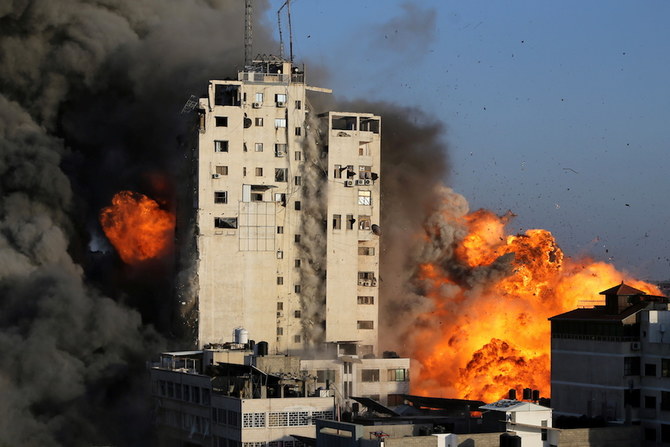GAZA CITY: The UN’s Middle East peace envoy on Wednesday warned of “all-out war” unless there was an “immediate ceasefire” as Israel’s bombardment of the Gaza Strip saw a dramatic rise in the Palestinian death toll.
Loud explosions continued throughout the day as Israel pounded Hamas targets and forces in Gaza responded by launching hundreds of rockets deep into Israeli territory.
The Palestinian Ministry of Health said that at least 56 people had so far been killed, including 14 children, five women, and an elderly man, while more than 335 had been injured.
In a statement, Tor Wennesland, UN special coordinator for the Middle East peace process, said: “Cease fire immediately. We are escalating toward an all-out war. Leaders on all sides must take responsibility for de-escalation.
“The cost of the war in Gaza is devastating and paid for by ordinary people. The UN is working with all parties to restore calm. Stop the violence now.”
Palestinian and Israeli reports said efforts were being made by Egypt, the UN, and a number of other countries to restore calm and return to the ceasefire agreement.
The bloodshed was triggered by weekend unrest at Jerusalem’s Al-Aqsa Mosque compound, which is sacred to both Muslims and Jews.
Military exchanges have escalated over recent days, sparking international pleas for an end to the violence.
On Wednesday, Israel targeted a number of Hamas government buildings and houses, private cars, agricultural plots, and military training sites belonging to the movement and Islamic Jihad were also hit.
Bombing was stepped up following the destruction of two residential towers in Gaza City, and Al-Qassam Brigades, the military wing of Hamas, retaliated by firing a barrage of rockets toward Tel Aviv and Beersheba. The commander of the Gaza brigade, Basem Issa, along with others were reported to have been killed during the strikes.
The Islamic Jihad announced that a number of its leaders belonging to its missile unit, most notably Muhammad Abu Al-Ata, died when an apartment in the center of Gaza City was hit.
Al-Qassam Brigades and Al-Quds Brigades fired hundreds of rockets toward Tel Aviv and Beersheba — cities far from Gaza that had not previously been targeted.
Mother-of-three Sherine Awad, 38, told Arab News: “The terror and fear do not stop. After the towers were hit, I moved from my apartment because it is in a high-rise. I moved to my friend’s house with my children, but last night a house was bombed near the place I took shelter in.
“This is not life. We cannot bear all this. The bombing does not stop, and the terrifying sounds are nonstop. My children are in a state of fear and shock. Our life has taken a U-turn from what was planned for the Eid reception.”
The streets of Gaza City were mostly empty on Wednesday except for some pedestrians and cars, while most of the shops remained closed barring some grocery stores.
Ahmed Al-Kahlout, a grocer on Nasr Street, told Arab News that on the last day of Ramadan people still needed supplies and “fear does not prevent them from buying food.
“There are deaths, but people in their homes want to eat. This is not the first time Gaza has faced an escalation, but this time it is the most severe since the 2014 war,” he said.
Despite both sides in the conflict threatening further bombing, Palestinians in Gaza are hoping the latest round of bloodshed and destruction will end soon.
“We hope this will end. It will definitely end, but when? Nobody knows. Hopefully, it will be soon,” Awad said.



























